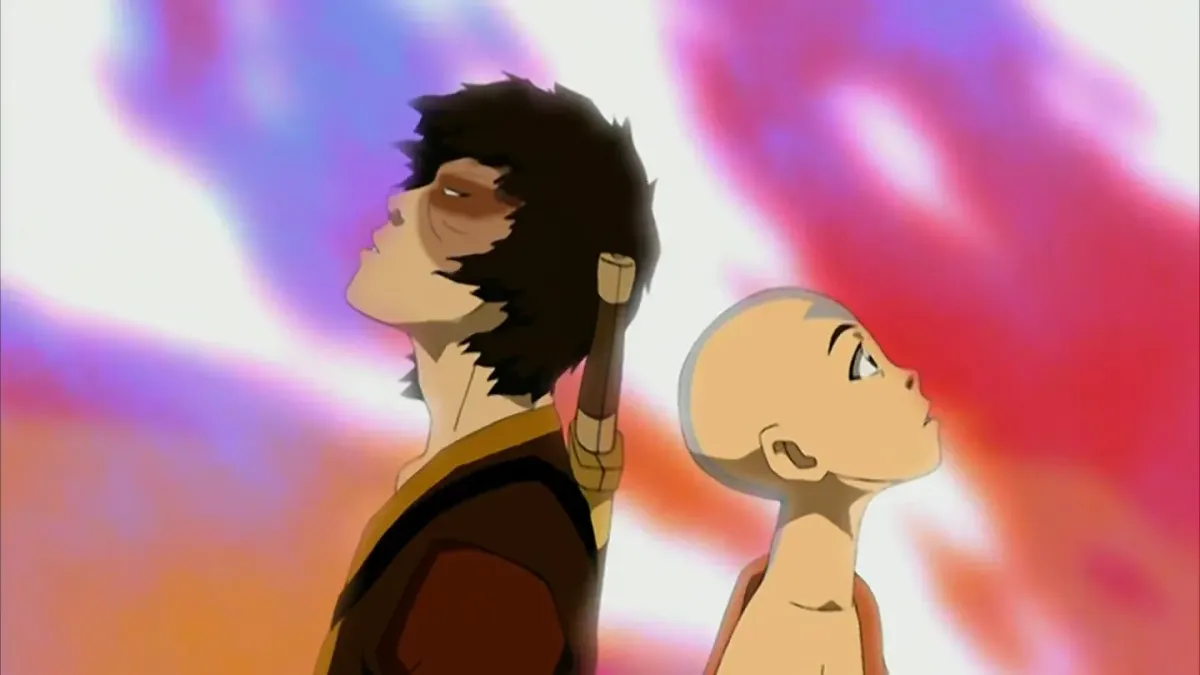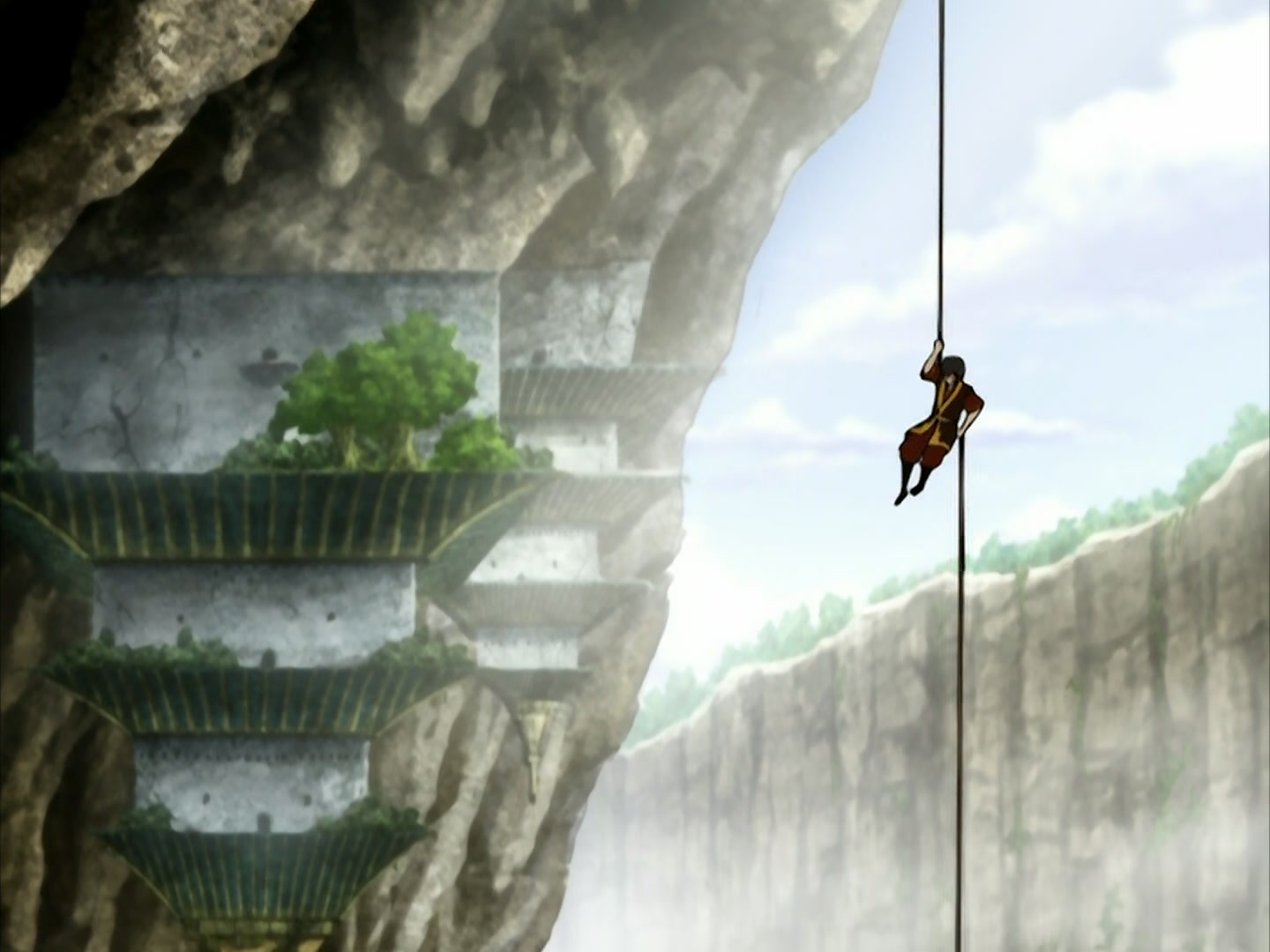Avatar: The Last Airbender: "Chapter Twelve: The Western Air Temple" and "Chapter Thirteen: The Firebending Masters"
In which Zuko... just Zuko

(This is the 22nd installment of my weekly recaps of Avatar: The Last Airbender, the Nickelodeon animated series that ran from 2005 to 2008 to much critical acclaim. I’ve never seen it! These recaps are only available to paid subscribers.)
- “Chapter Twelve: The Western Air Temple” (originally aired July 14, 2008)
- “Chapter Thirteen: The Firebending Masters” (originally aired July 15, 2008)

Who is the protagonist of Avatar: The Last Airbender?
The even money, of course, is on Aang. He's the one mentioned in the title, and he's the one who will save the world or consign it to ruin. We follow his growth from childlike goof to someone slightly more mature, and in this final season, his problems have grown commensurate with that maturity.
But wait: Are Katara and Sokka the twin protagonists of this show? It's easy to say that the show's story starts with Aang's reappearance after 100 years in the ice, but who finds him in that ice? It's a sister and brother whose journeys become intricately wrapped up with Aang's. You could make a real case for Katara as the show's protagonist and Sokka as its deuteragonist, one focused on the ways that the two of them grow and change over the course of the show. If you're looking to situate this story as a true coming-of-age narrative, in which we can see the kind of adult a young person will become, then Katara is perhaps the best candidate to center that narrative on.
But no, actually: The protagonist of Avatar: The Last Airbender is Prince Zuko.
Now, obviously, I'm using a definition of "protagonist" that hinges almost entirely on which character has the most significant arc. If we're merely looking for the character who actually drives the story forward most often, it's probably Aang or maybe Katara. But Zuko drives the story more than you'd expect, and he has the most dramatic character arc of the whole series. What's more, the show didn't really need to nail the character arcs for Aang and Katara to be successful. You can see evidence of that in the first season, when the show casts about a bit for what to do with them. It didn't have that luxury with Zuko. If he didn't work from frame one, the show wouldn't work.
What's even more impressive is how much the show seems to relax once Zuko is integrated into the main cast. He fits a hole in the gang that I didn't realize was there, in similar fashion to how Toph seemed a little like she had always been there once the show added her back in season two.
But the effect is even more pronounced here, because the show has taken almost all of the conflict external to the group and made it conflict internal to the group, which makes these long episodes between major events roil with more tension than they typically would. With Zuko hanging out with our main characters, the show has plenty of different relationships to draw off of and to build conflict out of. In just these two episodes, the series really feels like it's found another level.
I think that this sense of the show hitting new heights also stems from how gracefully it has guided us toward this seemingly inevitable conclusion. From the second that we met Zuko, it seemed clear that the show had plans for him beyond "will chase the Avatar forever," and from the second the show raised questions about who could teach Aang firebending, it was clear who that person would be. But even as it felt obvious where we were going, Avatar played out every emotional beat of that storyline, so the inevitability felt earned.
In other words, Avatar got us invested in Zuko both as a story and as a character. In a genre where his entire arc could have felt like a plot function, more or less, the show found a way to make every little beat matter. By not skipping many steps, Avatar gave us the breathing room to get invested in this kid and his journey. And by doing that, it found a way to bend the story around him without compromising its other elements.
There's this old maxim in storytelling that the villain is the hero of their own story. This is, so far as it goes, true. But it's been warped by our modern era of stories that are meant to give us an unfiltered look at the bad guys. Now, "the hero of their own story" increasingly means finding ever more elaborate justifications for why the villain is right, on some level. Yeah, we have to beat him, but don't you also kind of understand him?
Zuko is an example of a series taking the "hero of their own story" trope and doing something necessary with it. We understand why Zuko does what he does, and we maybe even sympathize with him. (In "Western Air Temple," Toph even says that Zuko could have turned out a lot worse.) But we never cross the line from "I understand this guy" to "This guy should probably capture the Avatar and help his family install fascist fire rule."
What Avatar does is much trickier. It makes us want to see Zuko turn good, even as we know he's probably going to turn good almost from the moment we meet him. To keep what happens to him from feeling cheap, the show has to almost lean into that inevitability, developing his character to such a degree that we find ourselves longing for him to realize how badly he's held prisoner by his own emotional blind spots and a family that never treated him as well as he deserved.
I don't know if that makes Zuko the protagonist of this show, but it sure gives him the most resonant character arc. I've never quite seen anybody like him on a kids show, and there's a reason he's probably my favorite character (give or take an Appa). He's always trying to do the right thing, and when he realizes the right thing is the hard thing, he does it anyway.
I spend a lot of time in these reviews saying that certain things feel predictable or something similar, and I'm constantly aware that I'm bringing my own expectations and knowledge about how storytelling works to a story that is aimed at people who are maybe encountering some of these tropes for the first time. When I say that something is predictable, though, I'm not complaining. All good stories feel a little bit inevitable in the end.
But what I found myself thinking about in these two episodes is just how satisfied I would have been as a little girl if these two episodes had been the very first time I encountered this particular set of tropes. As an adult who's consumed a lot of stories over the years, Prince Zuko's arc didn't surprise me, not exactly. But I can imagine that 11-year-old Emily who saw Aang and Zuko training together and had her mind blown.
Every use of a well-worn trope will be the first time somebody encounters that trope, and it will forever set their expectations for how that trope plays out. What sets the best uses of those tropes apart are when they still work for those of us who know precisely what we're getting into. Zuko's arc in Avatar works whether you know what's coming or have no idea, and it honestly works about as well in either case. That's an impressive thing to pull off, and it might be the show's signature triumph.
Other thoughts I thought:
- Wow, a whole recap where I barely talked about the episodes at hand, just like in the A.V. Club days! But I think you can probably gather why I did as such. These episodes are really powerful when considered through Zuko's point-of-view!
- The wait for these episodes must have been interminable. Between the first half of the season and the second, just under eight months passed. On the other hand, the final episodes of this show unfurled over six days. I cannot imagine how bananas that must have felt for the show's fans.
- I was wondering if anybody else shipped Zuko and Katara, and then I checked AO3.
- I love the Western Air Temple, because upside down stuff is just cool.
- Combustion Man never really became much more than his name, but he was a pretty enjoyable minor villain in spite of that. Zuko proving his worth to the group by throwing off the dude's aim just enough is a nice moment, and I also like that Combustion Man is just, like, "Yeah, I'm gonna kill the Avatar, pal, whether you like it or not."
- So the firebenders are just the Targaryens?
- I do love the sequence where the dragons dance in the air and show Aang and Zuko all the colors imaginable. It's really pretty, and the dragons are super cool.
- On the other hand, the show missed a big opportunity to let Zuko and Aang ride around on a dragon for the rest of the series.
- It also missed a big opportunity to have a dragon eat Momo. Though I guess that could still happen??
- The firebenders being from Mesoamerica is interesting, I guess? The show's mishmash of various cultures and historical influences is really cool, and I wonder what the fuck the discourse would be if it was doing shit like this in 2021. To be clear: I'm fascinated by it. I'm not sure what to make of it.
- It's very funny to me how often the show will have Sokka save the day just to be, like, "Yay, Sokka still exists!"
Next time: We're headed to "The Boiling Rock" for the show's final two-parter. Sounds like we're in for a prison break, hell yeah.




